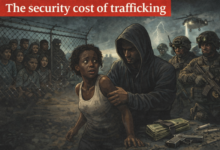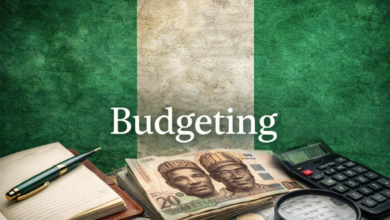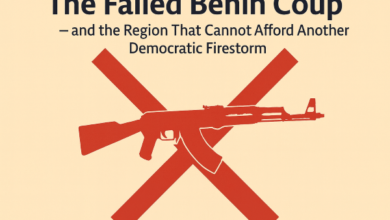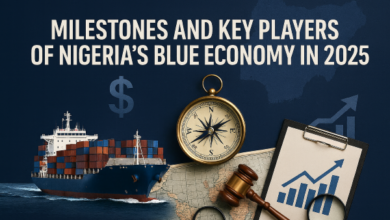#Endbadgovernance protests: Can AGF Fagbemi intervention make a difference on underaged detainees?
“This show of shame has also exposed Nigeria as a nation that goes to the United Nations to declare that it has abolished torture
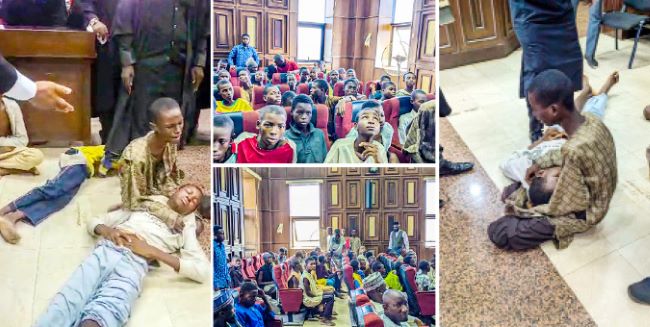
The 10 ‘Days of Rage’ also tagged #Endbadgovernance protests which swept through several major cities in Nigeria may have ended on Saturday, August 10, but some of the effects came to the fore recently with the humungous bail amounts placed on the underaged detainees undergoing trial for treason for participating in the protests.
There was a major uproar on Friday as some of the obviously malnourished children collapsed in court and had to be rushed to a clinic to receive medical attention.
Meanwhile, BRANDECONOMY reports that AGF Fagbemi has taken over the prosecution of 114 #EndBadGovernance protesters, addressing alleged treason and other charges against them.
This is coming after an outporing of condemnation from various individuals and groups. This includes the presidential candidates of the Peoples Democratic Party (PDP) and Labour Party (LP) in the last general elections, Atiku Abubukar and Peter Obi, respectively, Chairman, Senate Committee on Finance, Senator Sani Musa; the Civil Society Legislative Advocacy Centre (CISLAC), Rule of Law and Accountability Advocacy Centre (RULAAC) and Human Rights Writers Association of Nigeria (HURIWA). They had condemned the detention and prosecution of children who participated in the last Endbadgovernance protests.
Thisday reports that the #EndBadGovernance protest in Nigeria was not triggered by a single event, but rather, by a complex interplay of factors, chief among them the public’s growing frustration with the Government’s handling of both the economy and national security. This toxic combination of economic mismanagement and pervasive insecurity, has led to unprecedented levels of hunger, anger, and poverty across the nation. The immediate catalysts for the protest was the removal of fuel subsidies and the sudden decision to float the Naira – two policies whose poor execution only exacerbated the nation’s already dire economic situation. These policies, rather than providing relief, plunged the country into deeper economic turmoil, igniting a wave of discontent that had been simmering for years. Now that the days of rage have ended, it is imperative to reflect on the journey, to assess the outcomes, and to consider the road ahead.
Court admits 114 #EndBadGovernance protesters to N10m bail each
The #EndBadGovernance protests in Nigeria have emerged as a significant movement reflecting public discontent with the government’s handling of various socio-economic issues, including corruption, unemployment, and inadequate public services. The protests have led to the arrest and prosecution of numerous participants, including minors, raising serious concerns regarding human rights and the legal implications of detaining young protesters. Recently, Attorney General of the Federation (AGF) Lateef Fagbemi took over the prosecution of these protesters, which could potentially influence the legal landscape surrounding these cases.
The #EndBadGovernance protest in Nigeria was not triggered by a single event, but rather, by a complex interplay of factors, chief among them the public’s growing frustration with the Government’s handling of both the economy and national security. This toxic combination of economic mismanagement and pervasive insecurity, has led to unprecedented levels of hunger, anger, and poverty across the nation. The immediate catalysts for the protest was the removal of fuel subsidies and the sudden decision to float the Naira – two policies whose poor execution only exacerbated the nation’s already dire economic situation. These policies, rather than providing relief, plunged the country into deeper economic turmoil, igniting a wave of discontent that had been simmering for years. Now that the days of rage have ended, it is imperative to reflect on the journey, to assess the outcomes, and to consider the road ahead.
Civil society organisations, including the Socio-Economic Rights and Accountability Project, Amnesty International, and the Human Rights Writers Association of Nigeria, have condemned the continued detention of 76 #EndBadGovernance protesters, who were arraigned at the Federal High Court in Abuja Friday.
SERAP condemned the detention of the minors, calling on President Bola Tinubu to immediately release the protesters and drop all charges of treasonable felony against them, or face legal action.
“The Tinubu administration must unconditionally release the 76 #EndBadGovernance protesters and drop all charges of ‘treasonable felony’ against them, or face legal action. No one should ever be punished for the peaceful exercise of their human rights,”.
Amnesty International on its part said that the attempt to charge the minors with treason demonstrated “the government’s utter disregard for the rule of law,” while also calling for their immediate and unconditional release.
“Amnesty International condemns President Bola Tinubu’s government for the continued detention of minors who participated in the August #EndBadGovernance protests. The attempts to subject these minors to a sham trial over alleged ‘treason’ demonstrate the government’s utter disregard for the rule of law. Authorities must release them immediately and unconditionally,” the group stated.
Meanwhile, the National Coordinator of HURIWA, Emmanuel Onwubiko, in a statement, said the situation depicted Nigeria as a nation that has no respect for the fundamental rights of children.
“This show of shame has also exposed Nigeria as a nation that goes to the United Nations to declare that it has abolished torture, but the minors who were brought to court have created the opposite impression about Nigeria’s commitment to abolish torture in all its forms. Today is definitely a very sad day for Nigeria.
“The United Nations subcommittee on the Prevention of Torture, which reportedly visited Nigeria in September, will definitely need to revisit Nigeria and spend adequate time verifying the massive and callous application of torture in the various state-administered detention centres across the country, and then take strong measures to compel the Nigerian government to comprehensively abolish torture,” he added.
Onwubiko urged President Tinubu to immediately release the minors and order the Federal Ministry of Women Affairs to enrol them in schools or vocational training institutions, supporting them to live normal lives.
“We are saying let bygones be bygones, and the President should immediately release these children and order the Federal Ministry of Women Affairs to enrol them in schools or vocational training institutions to be trained in various self-sustaining opportunities and skills, and supported to live normal lives and contribute meaningfully to the development of Nigeria,” the statement read
Sen. Sani Musa (APC Niger East), has also condemned “the unjust treatment of minors” over their alleged involvement in the recent EndBadGovernance protests in Nigeria.
Musa in a statement issued to newsmen described the detention as “inhumane and unjust.”
“I strongly condemn the unjust detention of minors following the #EndBadGovernance protests.
“I am deeply troubled that, in spite of the hardships and challenges these young children have endured, there is a push to have them imprisoned rather than afforded compassion and understanding.
”Such actions are not only inhumane but also unjust,” he said.
The Senator also condemned the judicial stance advocating for the continued detention of the minors, saying it is unacceptable and contrary to the principles of justice and fairness.
He, therefore, urged the Inspector General of Police to launch an immediate investigation into the matter to ensure accountability “and protect the rights of these young citizens.”
“This issue must be addressed urgently, and I will continue to stand with my constituents and all Nigerians in the pursuit of justice and good governance,”he added.
What Can the AGF do?
AGF Fagbemi’s intervention in the prosecution of the #EndBadGovernance protesters comes amidst widespread criticism from civil society organizations and political leaders regarding the treatment of detainees, particularly minors. His involvement is seen as a pivotal moment that could reshape how these cases are handled legally and socially.Key Aspects of Fagbemi’s Intervention:
- Focus on Legal Process: By taking over the prosecution, Fagbemi aims to ensure that legal proceedings adhere to due process and human rights standards. This could lead to a more transparent judicial process, which is crucial given the allegations of treason against many protesters
- Addressing Public Concerns: His actions may also be an attempt to mitigate public outrage over the detention of minors and ensure that their rights are respected within the judicial system
Implications of Continued Detention of Minors
The ongoing detention of minors for participating in protests raises several critical issues:
- Human Rights Violations: Detaining minors for exercising their right to protest can be viewed as a violation of their fundamental human rights. International conventions, such as the Convention on the Rights of the Child (CRC), emphasize that children should not be subjected to punitive measures for participating in peaceful assembly.
- Psychological Impact: The psychological effects on minors detained in such circumstances can be profound. Reports indicate that one minor collapsed in court during proceedings, highlighting the stress and trauma associated with such experiences
. Long-term detention can lead to lasting emotional and mental health issues.
- Societal Implications: The continued detention of young protesters may deter future civic engagement among youth. If young people perceive participation in protests as dangerous or punitive, it could stifle democratic expression and activism.
- Legal Precedents: The handling of these cases under Fagbemi’s oversight may set important legal precedents regarding how minors are treated in similar situations. A fair and just approach could foster greater trust in Nigeria’s legal system among citizens.
Ultimately, AGF Lateef Fagbemi’s intervention in the prosecution of #EndBadGovernance protesters represents a critical juncture for Nigeria’s legal framework concerning civil rights and youth participation in governance. His actions may not only influence immediate legal outcomes but also shape broader societal attitudes towards governance, protest rights, and youth engagement in Nigeria. As this situation unfolds, it will be essential to monitor both the legal proceedings and their implications for human rights in Nigeria.



